

The risks of social isolation. Overview CE credits: 1 Learning objectives: After reading this article, CE candidates will be able to: Identify the effects of social isolation and loneliness on physical, mental and cognitive health.Explore how loneliness differs from social isolation.Discuss evidence-based interventions for combating loneliness.
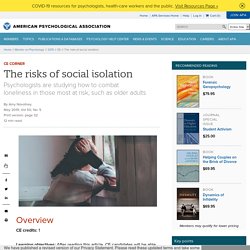
For more information on earning CE credit for this article, go to www.apa.org/ed/ce/resources/ce-corner.aspx. According to a 2018 national survey by Cigna, loneliness levels have reached an all-time high, with nearly half of 20,000 U.S. adults reporting they sometimes or always feel alone. Such numbers are alarming because of the health and mental health risks associated with loneliness. "There is robust evidence that social isolation and loneliness significantly increase risk for premature mortality, and the magnitude of the risk exceeds that of many leading health indicators," HoltLunstad says. Who is most likely? How social isolation affects mental and physical health - Insider. Social isolation can negatively affect mental health, as well as physical health.
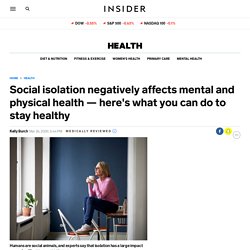
Research has found that perceived social isolation and loneliness are associated with depression, cognitive decline, poor sleep quality, a weaker immune system, and potential heart problems. Here are some of the best ways to stay mentally and physically healthy during social isolation. This article was medically reviewed by Mayra Mendez, Ph.D., LMFT, a licensed psychotherapist at Providence Saint John's Child and Family Development Center. Visit Insider's homepage for more stories. More than three in five Americans report feeling lonely, and that number has been rising.
It's widely recommended that everyone practice social distancing, which means staying six feet away from others and keeping trips to public spaces like grocery stores to a minimum. How Social Isolation Affects the Brain. Daisy Fancourt was at her home in Surrey in southeast England when the UK government formally announced a nationwide lockdown.
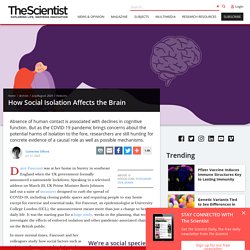
Speaking in a televised address on March 23, UK Prime Minister Boris Johnson laid out a suite of measures designed to curb the spread of COVID-19, including closing public spaces and requiring people to stay home except for exercise and essential tasks. For Fancourt, an epidemiologist at University College London (UCL), the announcement meant more than just a change to her daily life. It was the starting gun for a huge study, weeks in the planning, that would investigate the effects of enforced isolation and other pandemic-associated changes on the British public. The epidemic seniors in America were facing already (opinion) While the immediate concern for many parents has to be the bored, hyperactive child right in front of them, the greater risk of the quarantine is more likely to fall upon their parents, and not only because of older Americans at greater risk from the disease but also because odds are they were already lonely to begin with and further forced isolation, though necessary, could be dangerous.

At a time of intergenerational tensions, it's important to remember to have empathy for what seniors are going through in this crisis, and to ask what can be done to help them survive it -- both physically and mentally. Even before the onset of Covid-19, older Americans were experiencing an epidemic of social isolation and depression. One study found that loneliness is as dangerous to one's health as smoking 15 cigarettes a day. It can lead to dementia or Alzheimer's, heart disease, a weakened immune system and a shorter lifespan. Covid-19 is exacerbating loneliness The need for empathy. Social Isolation Leads to Depression for Seniors. As people age, they may become isolated; and that isolation can lead to depression, according to a recent post from the Straits Times.
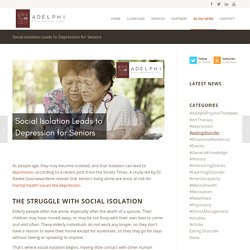
A study led by Dr. Nadee Goonawardene reveals that seniors living alone are most at risk for mental health issues like depression. The Struggle with Social Isolation Elderly people often live alone, especially after the death of a spouse. Their children may have moved away, or may be too busy with their own lives to come and visit often. Loneliness in Seniors: The Impact of Social Isolation on our Brains. In his hit “Only The Lonely (Know How I Feel),” legendary crooner Roy Orbison hits close to home regarding the heartache of being and feeling alone: “Only the lonely know the way I feel tonight…only the lonely know this feeling ain’t right.”
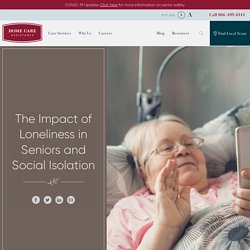
Yes, it’s true — feeling alone is no fun. But the fact remains that many American seniors spend most of their lives lonely and isolated from the outside world. Sure, everyone enjoys a little alone time. However, for too many seniors, remaining isolated does more than diminish one’s zest for life. It can increase the risk of disease — and may even precipitate an early death. The Science Behind Excess Alone Time on Senior Brains According to the Pew Research Center, over 27% of people over the age of 60 live alone. According to AARP survey results, 1 in 3 adults say they lack regular companionship, and 1 in 4 say they feel isolated from other people at least some of the time. A Clear Connection to Senior Health Issues.